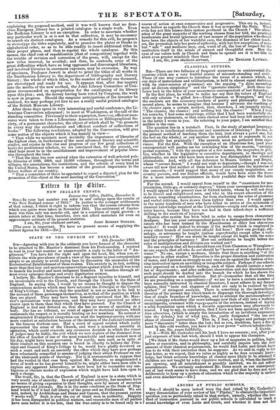STATE OF THE CHURCH OF ENGLAND.
5th _December 1853.
Sin—Agreeing with you in the estimate you have formed of the character to be attached to Mr. Maurice's dismissal from his Professorship, I rejoiced to read in your last number so unanswerable a reply to the letter of An- glicanua.' You have hit the right nail upon the head, Sir, when you at- tribute the wide prevalence of such a view of the matter as your correspondent adopts to an anxiety to avoid laying bare by discussion the anomalies of the Ecclesiastical Establishment of these realms. This anxiety is, in fact, nothing more than that lazy and spurious conservatism against which Arnold was wont to launch his loudest and most indignant thunders. It breathes through al- most every episcopal charge and every dignitarian sermon. I believe Mr. Mauriee's dismissal to be a flagrant injustice to himself, and an incalculable evil to the Church, and through the Church to the State of England. In saying this, I would by no means be thought to dispute the conscientious motives which may have actuated the Principal or the Council of King's College. I believe that the mischief is not so much to be laid to the account of these personages themselves, as to that of the position in which they are placed. They may have been honestly convinced that Mr. Mau- rice's speculations were dangerous, and they may have perceived no other course open to them than that which they have pursued. For the Church of England is tied and fettered so, that she has no means of speaking as a body. She has no tribunal, no court of appeal in doctrinal matters, which commands the respect or is morally binding on her members. No earnest or singleminded Evangelical clergyman can read the baptismal service with any more comfort or satisfaction because of the decision of the Judicial Committee in the famous Gorham case. Had a court of appeal existed which really represented the sense of the Church, and were a synodical assembly in operation, which could overrule any erroneous decision to which the wisest of judges may be liable, the evil which we now deplore of the dismissal from his office of teacher of one of the most remarkable and most earnest men of his day, might have been prevented. For surely, men such as in spite of their conduct on this occasion one is bound in charity to believe the Prin- cipal and Council of King's College to be, would have gladly devolved on such a court and such an assembly the office which they have now perhaps been reluctantly compelled to assume of judging their ablest Professor on one of the abstrusest points of theology. Nor is it unreasonable to suppose that had the verdict in that case been against Mr. Maurice, so singlemmded a lover of truth as he has proved himself to be, might either have been able to explain any apparent heterodoxy, or have been led to reconsider any am- biguous or obscure modes of expression which might have laid him open to Such a charge.
The truth, Sir, is, that the Church of England is now in a state which is very nearly one of anarchy: In a period of great activity, her members have no means of giving expression to their thoughts, save by means of sectarian newspapers and journals. She is in the same condition as the State of Eng- land would be if it had full liberty of the press and no Parliament. We are told, indeed, by Archbishops and Deans and Canons, that the present system "works well." Such is ever the cry of timid men in authority. Happily it has been disregarded in political matters and reasonable men of all parties have seen before it is too late, that the matters, safety is to be found only in a course of action at once conservative and progressive. This cry is, indeed more hollow as regards the Church than it was as regarded the State. What evils has not this Is' z-faire system produced in the Church ? The alien- ation of the great majority of the working classes from her fold, the practical heathenism and brutal ignorance of vast masses of the population who should have been the objects of her watchful care, the dismissal of her ablest teach- ers, the promotion into her posts of authority, with but few exceptions, of none but " safe " and mediocre men, and, worst of all, the loss of respect for the institution itself in the minds of earnest and thoughtful men. May the eyes of our rulers both in Church and State be opened ere it is too late to avert even greater mischiefs than these !


































 Previous page
Previous page